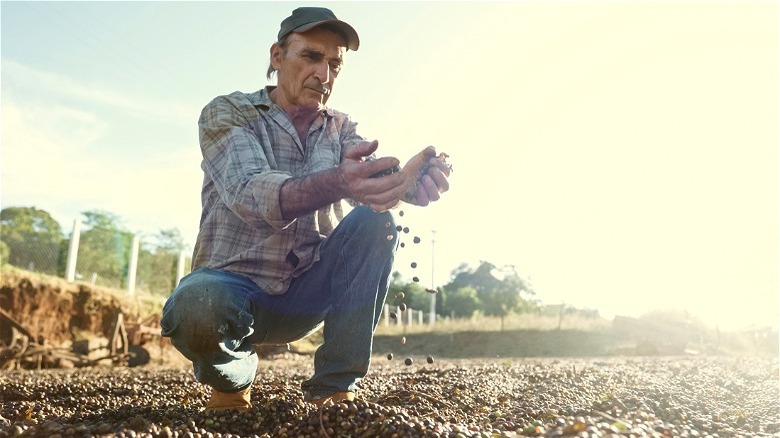Why Coffee Prices Might Be About To Skyrocket
Whether or not coffee is actually good for you, it probably feels like a necessity for many people. With the inflation rate peaking in June of this year, certain things have become more expensive. Food and fuel have seen some of the steepest price increases affecting Americans' bank accounts (per CNN Business).
While most of us have heard of the alarming ground beef cost and the rising price of eggs, coffee is another staple in the standard American grocery cart that has undergone a significant price change over the last year. According to the Bureau of Labor Statistics, coffee has seen a price surge of 38.8% over the last three consecutive years.
The demand for coffee has also risen. The United Kingdom experienced a demand increase of 9% in the first quarter of 2022, and consumption in the U.S. was up 4.6% (per Reuters). The soaring cost of food, the War in Ukraine, and supply chain issues have all contributed to coffee's high price tag. Yet there is one factor contributing to coffee's future cost that rests in the hands of mother nature herself.
Lack of rain means less coffee
When it comes to store-bought coffees, one thing is for sure: Most of the blends you find in coffee shops and grocery stores have a strong chance of being traced back to Brazil (per Visual Capitalist).
Unfortunately, Brazil faced harsh weather conditions that led to major disruptions in crop production last year. The country experienced a severe drought in 2021, and an unlikely frost swept over the nation last July, causing temperatures to drop below 30 degrees Fahrenheit (per Reuters). At the time, coffee analysts weren't quite sure how much crop damage had been done.
According to The Wall Street Journal, this year's crop estimates are currently a lot lower than what experts initially predicted, which may further drive up the price of beans. Arabica beans are measured on a 2-year cycle, with even-numbered years usually showing larger crop turnouts but this year, estimated predictions will be far from attainable.
According to José Marcos Magalhães, president of the Minasul coffee cooperative, most of his co-op members won't be able to turn in half of what they normally do. The predicted result: over a million fewer bags of coffee when compared to the total accrued in 2020 ( per The Wall Street Journal). While some people may consider coffee to be a necessity, only time will tell if this loss in production will test America's increase in demand.

